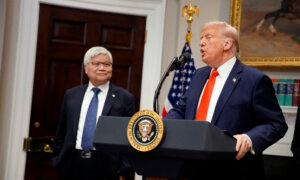The president is in favor of replacing the subsidies with high tariffs in a bid to get foreign companies to manufacture in the United States.
President Donald Trump is calling for an end to a $52.7 billion semiconductor subsidy program aimed at encouraging companies such as Intel, TSMC, and Samsung to expand manufacturing in the United States.
“Your CHIPS Act is a horrible, horrible thing. We give hundreds of billions of dollars and it doesn’t mean a thing. They take our money and they don’t spend it,” Trump said in a speech to Congress on March 4.
The president then urged House Speaker Mike Johnson (R-La.) to repeal the legislation and redirect unspent funds toward reducing the national debt or other priorities.
Trump’s recent comments are his strongest criticism yet of the Biden-era initiative, which seeks to bring high-end chip manufacturing to the United States through taxpayer-funded grants. Instead of subsidies, Trump argued, the country should have used tariffs to pressure foreign companies to manufacture domestically.
“All that was important to them was that they didn’t want to pay the tariffs, so they came and are building, and many other companies are coming,” he told the lawmakers.
On March 3, TSMC announced plans to invest $100 billion in U.S. manufacturing, including two additional facilities in Arizona. That commitment far exceeds the $65 billion the Taiwanese company had pledged for its three Arizona fabrication plants for CHIPS Act grants and loans.
Without TSMC’s voluntary investment, according to Trump, tariffs on its Taiwan-made chips could have reached a punishing 50 percent.
Passed in 2022, the CHIPS Act allocates $39 billion in grants—along with 25 percent tax credits and billions more in loans—to revitalize domestic semiconductor production after decades of offshoring to Asia.
In the final weeks of the Biden administration, the Department of Commerce finalized more than $33 billion in CHIPS Act awards, including $7.86 billion for Intel, $6.6 billion for TSMC, $6.1 billion for Micron, and $4.7 billion for Samsung.
Trump has dismissed them as bad deals.
“When I see us paying a lot of money to have people build chips, that’s not the way,” Trump said in November 2024 in an interview on the “Joe Rogan Experience” podcast. “You didn’t have to put up 10 cents, you could have done it with a series of tariffs.
“In other words, you tariff it so high that they will come and build their chip companies for nothing,” he said.
Johnson, who voted against the CHIPS Act, initially suggested that Republicans “probably will” try to repeal it following Trump’s comments on Joe Rogan’s podcast. He soon clarified that GOP lawmakers would rather “further streamline and improve the primary purpose” and remove requirements that have to do with the Biden administration’s Green New Deal.
Johnson didn’t respond by publication time to The Epoch Times’ request for comments.
Secretary of Commerce Howard Lutnick said during his Senate confirmation hearing that while he supports the CHIPS Act’s goal to develop a domestic semiconductor industry, he wants the law to undergo careful review.
“I can’t say I will honor something that I haven’t read,” Lutnick said after he was asked if he would honor finalized funding contracts that the Commerce Department has signed with the chipmakers.
“To the extent monies have been disbursed, I will commit to rigorously enforcing the documents that have been signed by those companies to make sure we get the benefit of the bargain. If they have agreed to do things, I will rigorously enforce them.”







